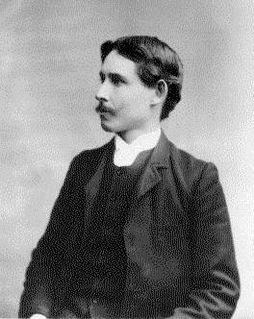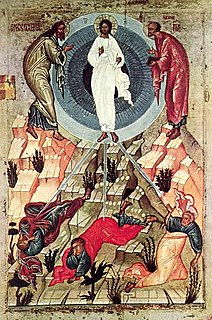Related Research Articles

Nathaniel Lardner was an English theologian.
Thomas Erskine of Linlathen was a Scottish advocate and lay theologian in the early part of the 19th century. With his friend the Reverend John McLeod Campbell he attempted a revision of Calvinism.

The Imitation of Christ is a Christian devotional book by Thomas à Kempis, first composed in Latin c. 1418–1427. It is a handbook for spiritual life arising from the Devotio Moderna movement, of which Kempis was a member.

Archibald Lampman was a Canadian poet. "He has been described as 'the Canadian Keats;' and he is perhaps the most outstanding exponent of the Canadian school of nature poets." The Canadian Encyclopedia says that he is "generally considered the finest of Canada's late 19th-century poets in English."
Sanctification is the act or process of acquiring sanctity, of being made or becoming holy.

Christian mysticism refers to mystical practices and theory within Christianity. Mysticism is not so much a doctrine as a method of thought. It has often been connected to mystical theology, especially in the Catholic Church and Orthodox Christianity.

The Cloud of Unknowing is an anonymous work of Christian mysticism written in Middle English in the latter half of the 14th century. The text is a spiritual guide on contemplative prayer in the late Middle Ages. The underlying message of this work suggests that the way to know God is to abandon consideration of God's particular activities and attributes, and be courageous enough to surrender one's mind and ego to the realm of "unknowing", at which point one may begin to glimpse the nature of God.

Jacob Bryant (1715–1804) was an English scholar and mythographer, who has been described as "the outstanding figure among the mythagogues who flourished in the late eighteenth and early nineteenth centuries."

Lady Charlotte Susan Maria Bury was an English novelist, who is chiefly remembered in connection with a Diary illustrative of the Times of George IV (1838).
George Sale (1697–1736) was a British Orientalist scholar and practising solicitor, best known for his 1734 translation of the Quran into English. In 1748, after having read Sale's translation, Voltaire wrote his own essay "De l'Alcoran et de Mahomet". Voltaire shared Sale's view that Mohammed was a "sublime charlatan" Voltaire bestowed high praise on Sale but misasserted him to have spent twenty-five years in Arabia.

Edmund Law was a priest in the Church of England. He served as Master of Peterhouse, Cambridge, as Knightbridge Professor of Philosophy in the University of Cambridge from 1764 to 1769, and as bishop of Carlisle from 1768 to 1787.

John Campbell was a Scottish author. He contributed to George Sale's Universal History, and wrote a Political Survey of Britain (1744). He was both prolific and well paid: according to James Boswell, Samuel Johnson spoke of Campbell to Joseph Warton as 'the richest author that ever grazed the common of literature.'
Diana Primrose was the author of a eulogy to the deceased Queen Elizabeth published as A Chaine of Pearle, Or a Memoriall of the peerles Graces, and Heroick Vertues of Queene Elizabeth of Glorious Memory.Composed by the Noble Lady, Diana Primrose. It is thought that this piece was written not only as a tribute to the 45-year reign of Elizabeth but as a criticism of the sometimes hot-headed King James, as well as a social criticism. The Chaine itself is made up of ten "Pearles" or short poems detailing virtues found in Elizabeth; some of these Pearles however are not qualities directly attributed to Elizabeth and thus it is considered that they may present a criticism of the then current ruler.
Archibald Campbell was a Church of Scotland minister and moral philosopher.

Reverend Doctor George Campbell Morgan D.D. was a British evangelist, preacher, a leading Bible teacher, and a prolific author.
Alexander Balfour (1767–1829) was a Scottish novelist born in the parish of Monikie, Forfarshire.
George Sewell was an English physician and poet, known as a controversialist and hack writer.

William Robertson (1705–1783) was an Irish clergyman, known as a theological writer and schoolmaster. Theophilus Lindsey wrote of Robertson as "the father of unitarian nonconformity".
Edward King (1735?–1807) was an English barrister and writer. His best-known works were on castles and antiquities.
John of Dalyatha (c. 690 – c. 780), commonly known as John Saba and in Syriac Yoḥannan, was a monk and mystic of the Church of the East. He spent his entire life in Upper Mesopotamia, alternating between coenobitic (community-based) and eremitic (solitary) monasticism, with a preference for the latter. At the time of his death, he was serving as the abbot of a community of monks.
References
![]() This article incorporates text from a publication now in the public domain : "Campbell, Archibald (fl.1767)". Dictionary of National Biography . London: Smith, Elder & Co. 1885–1900.
This article incorporates text from a publication now in the public domain : "Campbell, Archibald (fl.1767)". Dictionary of National Biography . London: Smith, Elder & Co. 1885–1900.